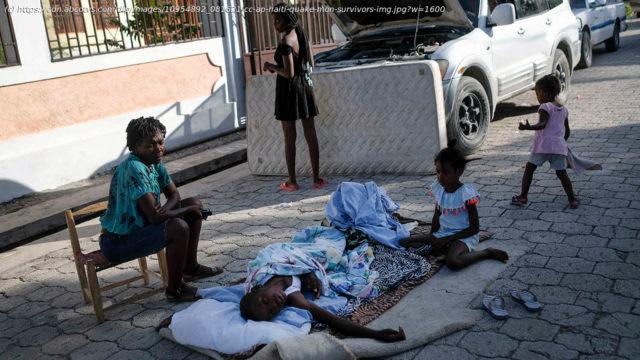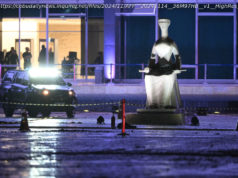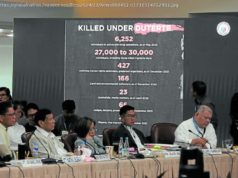Many Haitians injured during an earthquake over the weekend are in the open, under burning heat, waiting for help as hospitals overflow with patients.
LES CAYES, Haiti — Under Haiti’s burning heat, Jennie Auguste lies with a lost, thousand-yard stare on a flimsy foam mattress placed on an airport’s tarmac. A resident of the southwestern part of the Caribbean nation, Auguste has wounds in the chest, abdomen and arm after the roof of the store she worked at collapsed during a powerful earthquake over the weekend. She flashes the occasional grimace of pain while her sister or other helpful bystanders fan her. In the badly damaged coastal town of Les Cayes, health care is at capacity, so Auguste can now only wait – for space at a local hospital, or a spot on one of the small planes that are ferrying injured people to Haiti’s capital. »There has been nothing. No help, nothing from the government, » Auguste’s sister, Bertrande, said Sunday as Haitians were still trying to take stock of everything around them as the death toll from disaster soared. The country’s Civil Protection Agency said 1,297 dead from the magnitude 7.2 earthquake had been counted by Sunday, a day after the temblor turned thousands of structures into rubble and set off frantic rescue efforts ahead of a potential deluge from an approaching storm. Saturday’s earthquake also left at least 5,700 people injured, with thousands more displaced from destroyed or damaged homes. After sundown Sunday, Les Cayes was darkened by intermittent blackouts, and many people slept outside again, clutching small transistor radios tuned to news, terrified of the continuing aftershocks. The devastation could soon worsen with the coming of Tropical Depression Grace, which is predicted to reach Haiti on Monday night. The civil protection agency said Haitians must expect strong winds, heavy rain, rough seas, landslides and flooding. Officials said more than 7,000 homes were destroyed and nearly 5,000 damaged. Hospitals, schools, offices and churches were also affected. The quake centered about 125 kilometers (78 miles) west of the capital of Port-au-Prince nearly razed some towns and triggered landslides that hampered rescue efforts in a country that is the poorest in the Western Hemisphere. It already was struggling with the worsening poverty, the coronavirus pandemic, the political uncertainty following the July 7 assassination of President Jovenel Mose and a wave of gang violence.






